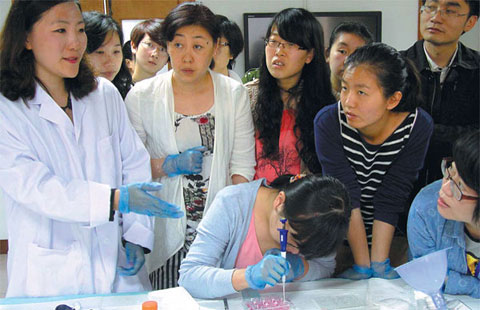Hunan plant shut down as probe into lead poisoning of children begins
Updated: 2014-06-16 08:35
By Feng Zhiwei, Wen Xinzheng in Changsha and Luo Wangshu in Beijing (China Daily)
|
||||||||
A chemical plant in central China's Hunan province was shut down on Sunday on suspicion of being linked to the lead poisoning of more than 300 local children, following a report on Saturday about blood-test results.
The chemical plant, Meilun Chemical Materials Limited Co, which is suspected of discharging untreated water and waste, has been shut down, including the turning off of electricity and disassembling of manufacturing equipment, according to a news release on Sunday from the Hengdong county government. Additionally, the county's public security bureau has launched an investigation of the plant, according to the news release.
A report by China Central Television (CCTV) on Saturday said that blood tests on more than 300 children in Dapu township of Hengdong county found excessive levels of lead since 2012, indicating heavy metal poisoning.
The blood tests showed that the lead densities among local children reached as high as 501 micrograms per liter, far above the national standard of 100 micrograms per liter for children.
A Dapu resident surnamed Tang, who refused to disclose her full name, said that tests on her 14-year-old son, Li Long, showed excessive lead in his blood.
"Luckily the lead densities in his blood test are not way too high," Tang said.
Since becoming aware of the plant's suspected pollution last June, villagers began drinking bottled water instead of water from the well, according to Tang.
Local villagers panicked when many children were found to have excessive levels of lead in blood tests. They accused the Meilun company of discharging untreated dust and wastewater, both of which could cause lead poisoning.
Reports from CCTV said that the closer to the factory the children live, the higher the lead levels in the tests.
The head of Dapu township, Su Genlin, told a CCTV reporter that the lead poisoning was not necessarily caused by the plant.
"Children bite pencils, which may also cause the excessive levels of lead (in their blood)," Su was quoted as saying.
Huang Shuhan, physician of Xinqiao Hospital in Chongqing, said that excessive amounts of lead in the blood can harm the nervous system.
"Children who suffer lead poisoning may become retarded," he said, adding that pencil biting wouldn't harm 300 children at the same time. "It is not a single case," he said.
Cheng Jie, an environmental engineer at COWI, a consulting firm for engineering and planning, said that lead has been categorized as dangerous waste in chemical plants and should go through a strict procedure for degradation.
luowangshu@chinadaily.com.cn

 World Cup fever grips Chinese soccer fans
World Cup fever grips Chinese soccer fans
 Alibaba documentary maker wants his Crocodile on US TV
Alibaba documentary maker wants his Crocodile on US TV
 Consul general welcomed
Consul general welcomed
 Tender moments of world leaders with their children
Tender moments of world leaders with their children
 Chinese fleet joins others for RIMPAC exercise
Chinese fleet joins others for RIMPAC exercise
 Obama visits native American reservation
Obama visits native American reservation
 Clinton has reasons to run at her ready
Clinton has reasons to run at her ready
 Angelina Jolie shines at summit against sexual violence
Angelina Jolie shines at summit against sexual violence
Most Viewed
Editor's Picks

|

|

|

|

|

|
Today's Top News
Former US congressman: Diaoyu belongs to China
US options could help combat advances by Iraqi militants
US applauds voting in Afghan presidential polls
Oregon high school shooter's parents offer apology
Army: Bergdahl 'looked good' after returning to US
Envoy rebuts Vietnam, Philippines on sea issue
Cui: China poses no threat to US
Japanese F-15 tails Chinese jet at close distance
US Weekly

|

|







